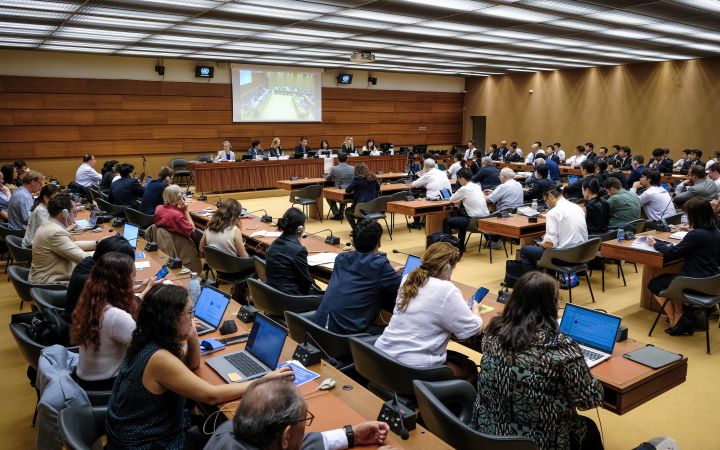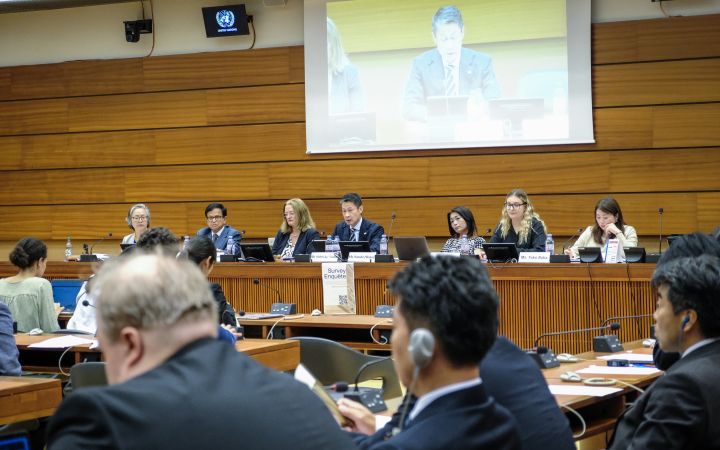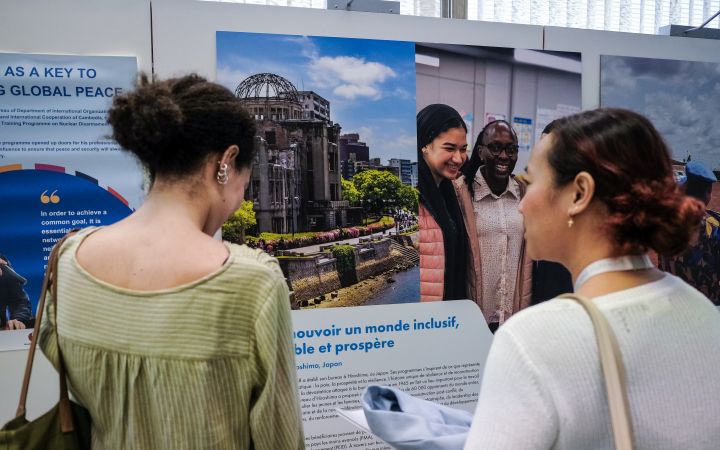- On 24 July 2024, UNITAR, with Hiroshima Prefecture and Nagasaki Prefecture, supported a side event at the Second Preparatory Committee for the 2026 Review Conference of the Parties to the Treaty on the Non-Proliferation of Nuclear Weapons (NPT).
- The panel discussion, “Advancing the Global Agenda of a Nuclear-Weapon-Free World,” was hosted by the Government of Austria and held in Geneva.
- The panellists discussed disarmament, non-proliferation and nuclear safety-security from various perspectives.
- UNITAR also held a panel exhibition featuring alumni and trainers from its Hiroshima Nuclear Disarmament and Non-Proliferation training programme.
23 August 2024, Hiroshima, Japan – On 24 July 2024, UNITAR, together with Hiroshima Prefecture and Nagasaki Prefecture, supported the Government of Austria–hosted panel discussion, “Advancing the Global Agenda of a Nuclear-Weapon-Free World” in Geneva. The panel discussion was a side event to the Second Preparatory Committee for the 2026 Review Conference of the Parties to the Treaty on the Non-Proliferation of Nuclear Weapons (NPT). The panel discussion aimed to build a network of experts and youth, establish a common platform to discuss the humanitarian and environmental impact of nuclear weapons, and empower young people to engage in nuclear disarmament.
- The panelists had a deep discussion about achieving a nuclear-weapon-free world from the perspectives of humanity, sustainability, interconnectivity, and youth empowerment. Referring to current geopolitical challenges, especially the Ukraine war and the Gaza conflict, the debate explored not only the use of nuclear weapons but also the role of deterrence by having and procuring nuclear weapons. It highlighted how nuclear disarmament continues to be an urgent issue that requires the world to work together as one.
DISCUSSION HIGHLIGHTS
Ambassador Désirée Schweitzer, Permanent Representative of Austria in Geneva, pointed out the connection between the humanitarian perspective on nuclear weapons and disarmament.
The humanitarian and environmental consequences and risks associated with nuclear weapons make nuclear deterrence a precarious and unsustainable approach to global security procurance.” —Ambassador Désirée Schweitzer, Permanent Representative of Austria in Geneva
The Governor of Hiroshima Prefecture Mr. Hidehiko Yuzaki underscored the importance of nuclear abolition for peaceful lives. Citing the disruptions in global food supply caused by the conflict between Russia and Ukraine, Governor Yuzaki pointed to the interconnectedness of nuclear capability and human sustainability.
The very existence of nuclear weapons impacts the sustainable future of the earth and mankind.” —Governor of Hiroshima Prefecture Mr. Hidehiko Yuzaki
Prof. Kazuko Hikawa, Vice Director of the Research Center for Nuclear Weapons Abolition, Nagasaki University, argued for the need to address disarmament with all its interrelated issues, recognizing common values.
At the time the UN was organized, [people] were recognizing all the issues were interconnected and interrelated. [But] they have not proposed any concrete solution to solve these interconnected issues.” —Prof. Kazuko Hikawa, Vice Director of Research Center for Nuclear Weapons Abolition, Nagasaki University
Ms. Vanessa Canola, a participant in the United Nations Office for Disarmament Affairs (UNODA) Youth Leader Fund for a World without Nuclear Weapons, emphasized youth empowerment and engagement.
True progress demands way more than symbolic gestures. It requires dedication to nurturing the young people’s potential and incorporating their perspectives meaningfully.” —Ms. Vanessa Canola, participant of the UNODA Youth Leader Fund for a World without Nuclear Weapons
PANEL EXHIBITION
In addition to the panel discussion, UNITAR held a panel exhibition during the Preparatory Committee. The exhibition featured the UNITAR Nuclear Disarmament and Non-Proliferation programme in Hiroshima, Japan. It presented the voices of programme alumni and trainers from the past 10 years, who shared their learnings from Hiroshima’s reconstruction and their commitment to a nuclear-weapon-free world.
FULL LIST OF SPEAKERS
PANELLISTS
- Ambassador Désirée Schweitzer, Permanent Representative of Austria in Geneva
- Mr. Hidehiko Yuzaki, Governor, Hiroshima Prefecture
- Prof. Kazuko Hikawa, Vice Director of Research Center for Nuclear Weapons Abolition, Nagasaki University
- Ms. Vanessa Canola, participant in the UNODA Youth Leader Fund for a World without Nuclear Weapons
MODERATOR
Mr. Nikhil Seth, United Nations Assistant Secretary-General and UNITAR Executive Director
SPECIAL GUEST
Ms. Yuko Baba, Vice Governor, Nagasaki Prefecture
ABOUT UNITAR
The United Nations Institute for Training and Research (UNITAR) is a dedicated training arm of the United Nations. In 2022, UNITAR trained over 395,000 learners around the world to support their actions for a better future. UNITAR has a global presence, with offices in Geneva, Hiroshima, New York, and Bonn and networks around the world.




